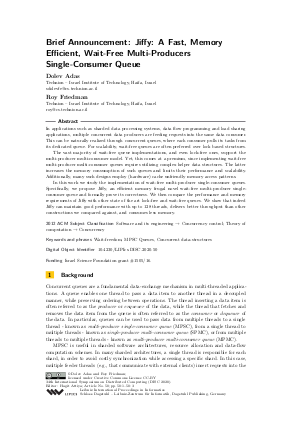Brief Announcement: Jiffy: A Fast, Memory Efficient, Wait-Free Multi-Producers Single-Consumer Queue
Authors Dolev Adas, Roy Friedman
-
Part of:
Volume:
34th International Symposium on Distributed Computing (DISC 2020)
Part of: Series: Leibniz International Proceedings in Informatics (LIPIcs)
Part of: Conference: International Symposium on Distributed Computing (DISC) - License:
 Creative Commons Attribution 3.0 Unported license
Creative Commons Attribution 3.0 Unported license
- Publication Date: 2020-10-07
File

PDF
LIPIcs.DISC.2020.50.pdf
- Filesize: 263 kB
- 3 pages
Document Identifiers
Subject Classification
ACM Subject Classification
- Software and its engineering → Concurrency control
- Theory of computation → Concurrency
Keywords
- Wait-freedom
- MPSC Queues
- Concurrent data-structures
Metrics
- Access Statistics
-
Total Accesses (updated on a weekly basis)
0Document
0Metadata
Abstract
In applications such as sharded data processing systems, data flow programming and load sharing applications, multiple concurrent data producers are feeding requests into the same data consumer. This can be naturally realized through concurrent queues, where each consumer pulls its tasks from its dedicated queue. For scalability, wait-free queues are often preferred over lock based structures. The vast majority of wait-free queue implementations, and even lock-free ones, support the multi-producer multi-consumer model. Yet, this comes at a premium, since implementing wait-free multi-producer multi-consumer queues requires utilizing complex helper data structures. The latter increases the memory consumption of such queues and limits their performance and scalability. Additionally, many such designs employ (hardware) cache unfriendly memory access patterns. In this work we study the implementation of wait-free multi-producer single-consumer queues. Specifically, we propose Jiffy, an efficient memory frugal novel wait-free multi-producer single-consumer queue and formally prove its correctness. We then compare the performance and memory requirements of Jiffy with other state of the art lock-free and wait-free queues. We show that indeed Jiffy can maintain good performance with up to 128 threads, delivers better throughput than other constructions we compared against, and consumes less memory.
Cite As Get BibTex
Dolev Adas and Roy Friedman. Brief Announcement: Jiffy: A Fast, Memory Efficient, Wait-Free Multi-Producers Single-Consumer Queue. In 34th International Symposium on Distributed Computing (DISC 2020). Leibniz International Proceedings in Informatics (LIPIcs), Volume 179, pp. 50:1-50:3, Schloss Dagstuhl – Leibniz-Zentrum für Informatik (2020)
https://doi.org/10.4230/LIPIcs.DISC.2020.50
BibTex
@InProceedings{adas_et_al:LIPIcs.DISC.2020.50,
author = {Adas, Dolev and Friedman, Roy},
title = {{Brief Announcement: Jiffy: A Fast, Memory Efficient, Wait-Free Multi-Producers Single-Consumer Queue}},
booktitle = {34th International Symposium on Distributed Computing (DISC 2020)},
pages = {50:1--50:3},
series = {Leibniz International Proceedings in Informatics (LIPIcs)},
ISBN = {978-3-95977-168-9},
ISSN = {1868-8969},
year = {2020},
volume = {179},
editor = {Attiya, Hagit},
publisher = {Schloss Dagstuhl -- Leibniz-Zentrum f{\"u}r Informatik},
address = {Dagstuhl, Germany},
URL = {https://drops.dagstuhl.de/entities/document/10.4230/LIPIcs.DISC.2020.50},
URN = {urn:nbn:de:0030-drops-131287},
doi = {10.4230/LIPIcs.DISC.2020.50},
annote = {Keywords: Wait-freedom, MPSC Queues, Concurrent data-structures}
}
Author Details
Funding
Israel Science Foundation grant #1505/16.
References
-
Keren Censor-Hillel, Erez Petrank, and Shahar Timnat. Help! In ACM Symposium on Principles of Distributed Computing (PODC), pages 241-250, 2015.

-
Panagiota Fatourou and Nikolaos D Kallimanis. Revisiting the Combining Synchronization Technique. In Proc. of the ACM SIGPLAN Symposium on Principles and Practice of Parallel Programming (PPoPP), volume 47 (8), pages 257-266, 2012.

-
Maurice Herlihy. Wait-Free Synchronization. ACM Transactions on Programming Languages and Systems (TOPLAS), 13(1):124-149, 1991.

-
Maurice Herlihy and Nir Shavit. The Art of Multiprocessor Programming. Morgan Kaufmann, 2011.

-
Edya Ladan-Mozes and Nir Shavit. An Optimistic Approach to Lock-Free FIFO Queues. In Distributed Computing, 18th International Conference (DISC), pages 117-131, 2004.

-
Nhat Minh Lê, Adrien Guatto, Albert Cohen, and Antoniu Pop. Correct and Efficient Bounded FIFO Queues. In 25th International Symposium on Computer Architecture and High Performance Computing, pages 144-151. IEEE, 2013.

-
Maged M. Michael and Michael L. Scott. Simple, Fast, and Practical Non-Blocking and Blocking Concurrent Queue Algorithms. In Proceedings of the 15th Annual ACM Symposium on Principles of Distributed Computing (PODC), pages 267-275, 1996.

-
Nicholas Nethercote and Julian Seward. Valgrind: A Program Supervision Framework. Electronic notes in theoretical computer science, 89(2):44-66, 2003.

-
William N. Scherer, Doug Lea, and Michael L. Scott. Scalable Synchronous Queues. In Proceedings of the ACM SIGPLAN Symposium on Principles and Practice of Parallel Programming (PPOPP), pages 147-156, 2006.

-
Michael L. Scott. Non-Blocking Timeout in Scalable Queue-Based Spin Locks. In Proc. of the 21st ACM Symposium on Principles of Distributed Computing, (PODC), pages 31-40, 2002.

-
Michael L. Scott and William N. Scherer. Scalable Queue-Based Spin Locks with Timeout. In Proceedings of the ACM SIGPLAN Symposium on Principles and Practice of Parallel Programming (PPOPP), pages 44-52, 2001.

-
Nir Shavit and Asaph Zemach. Scalable Concurrent Priority Queue Algorithms. In Proc. of the 18th ACM Symp. on Principles of Distributed Computing (PODC), pages 113-122, 1999.

-
Chaoran Yang and John Mellor-Crummey. A Wait-Free Queue as Fast as Fetch-and-Add. Proc. of the ACM Symp. on Principles and Practice of Parallel Programming (PPoPP), 2016.

